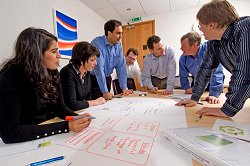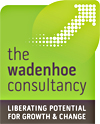|
"Oh this learning - what a thing it is..."
 Yet in the fast-paced environment in which we find ourselves, high quality learning is not enough. It's about helping teams to use their combined learning in a creative way to focus on new solutions and outcomes. Organisations don't want training and development initiatives! In some ways this is like the flash of inspiration that led Black & Decker, the world's largest producer of power tools and accessories, to realise that their customers did not want to buy a drill! What they really want is a hole somewhere, or even more fundamentally they may just want something attached to the wall. Unfortunately they have discovered that they cannot go into their local DIY store and by a bag of holes, and therefore buying a drill is the only alternative. In a faced-paced environment the dual challenge facing leaders and their teams is how to balance: running the business (operational effectiveness) with transforming the business (change capability). As a result, more and more of our work is about sustainable learning, where the emphasis is on helping leaders at every level to energise/engage their teams in learning and capitalise on this learning to address new business challenges.
Energised and Engaged Teams Our research clearly identifies that individual and team learning is energised when the focus shifts:
And Line Managers have a key leadership role in achieving this by developing: Commitment: Helping team members to understand the business goals, shape their own learning goals accordingly and believe that they can make a difference. Confidence: Giving team members the courage to walk towards challenges and try new ways. Energy: Being clear about what the performance outcome from learning will look like and positively encouraging team members when they are working in a new way. Competence: Spending more time developing team members and continuously exploring ways for them to utilise their full potential. Capitalising on Learning
In his Harvard Business Review article twenty years ago: "Teaching Smart People How To Learn", Chris Argyris introduced the concept of Single and Double-Loop Learning. One of the key messages is that many change situations don't require new development, but the use of existing skills, knowledge and experiences in new ways. Our research is full of examples where the effectiveness of individuals and teams has been significantly increased to cope with new challenges, through effective team coaching and facilitation, without any additional off-job development. In this summary, we have developed Mode 1 and Mode 2 statements to illustrate our view of the shift required:
The question is: how much organisational learning is "stuck" in the Mode 1 box? Here the team coaching role is about facilitating team members to re-work, adapt, make connections and widen their understanding. We have developed two highly interactive one-day workshops to expand on this thinking and provide practical solutions that can be applied immediately. They can be tailored to fit organisational needs and are suitable for: Line Managers - who, as part of their leadership role, need new Team Coaching skills. HR Developers - growing their role from "training deliverer" to "learning & development partner". For more information on Wadenhoe research, case studies, tools and workshops, please contact Ray Atkinson at: ray@wadenhoeconsultancy.com. |
